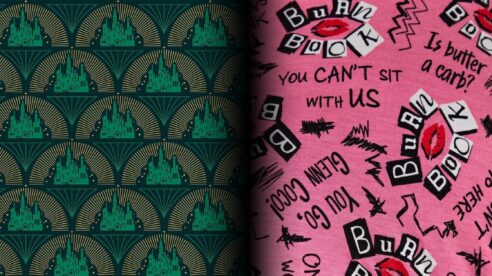By Elena Erdley
Rising Stars is a series of thoughts, reflections and perspectives by the interns at Devine + Partners. Elena Erdley is a rising senior at Temple University studying Public Relations with a minor in Event and Entertainment Management and a Certificate in Children’s Media.
With the rise of Broadway-to-Hollywood adaptations, it has become clear that not all modern movie musicals are marketed equally – and this offers some lessons for PR pros who don’t know a sitzprobe from a dress rehearsal.
“Mean Girls” (2024) and “Wicked” (2024/2025) were promoted to audiences in drastically different ways with strikingly clear results. While both are musicals, “Mean Girls” nearly hid that fact in its press campaign, whereas “Wicked” leaned all the way in.
The contrasting campaigns behind “Wicked” (2024/2025) and “Mean Girls” (2024) offer valuable lessons in audience targeting, tone, and media strategy. While “Mean Girls” leaned into virality, internet humor, and Gen Z appeal, “Wicked” opted for a story-focused rollout that emphasized theatricality, legacy, and emotional scale.
This blog unpacks how each movie musical’s PR strategy reflected its brand identity and highlights key takeaways for communicators looking to balance modern engagement tactics with authentic storytelling and long-term brand value.
Ultimately, the way these two movie musicals were promoted, and the public response they received, show what can happen if you don’t commit to telling your story both clearly and authentically.
Mean Girls: A Musical in Disguise
“Mean Girls” played their publicity campaign fast and loose, using hints of nostalgia while also branding the film as “Not your mother’s Mean Girls.” The brand came across as very Gen Z-centric, irreverent, and meme-driven, as TikTok and Instagram Reels were the primary platforms where content was focused. Viral moments, cast-driven content, and nostalgic modernity leveraged existing TikTok fame and Gen-Z influencers.
While focused on cast personalities, virality, and cheeky bits of nostalgia, the trailers and teasers omitted the songs and choreography from the film. Social content gave little to no exposure of the musical elements so crucial to the success of the musical itself. While attempting to manage expectations between the 2004 fans, the musical’s fans, and new audiences, the promotional materials surprised and confused viewers who weren’t clear that it was a musical at all when they went in.
Wicked: A Musical and Proud of It
In a clear contrast to “Mean Girls”, “Wicked” (2024/2025) embraced a publicity strategy rooted in prestige, reverence, and theatrical emphasis. From the start, the film marketed itself as an “event,” emphasizing its scale and emotional weight. The trailers showcased key musical moments and choreography, signaling to audiences that this was unapologetically a musical (and a grand one at that).
Public relations efforts leaned heavily on legacy and spectacle. Broadway icons such as Idina Menzel and Kristin Chenoweth, who originated the stage roles of Elphaba Thropp and Galinda Upland, were included in press events, connecting with long-time fans and reinforcing the film’s deep ties to its Gershwin Theater origins. This reverence extended to the visual and tonal branding. Emerald hues, original logo elements, and musical iconography were consistent across teaser content.
The media rollout followed a traditional, high-prestige route. A trailer debuted during the Super Bowl, coverage appeared in Vanity Fair, and the campaign maintained a controlled, slow-burn strategy rather than a viral or fast-paced one. Exclusive interviews, theatrical trailers, and placements in glossy outlets helped shape a narrative of serious artistry and cultural weight.
Star power played a key role in the PR strategy. Ariana Grande and Cynthia Erivo’s involvement was carefully managed, with their transformations into Glinda and Elphaba framed as major acting milestones. The press leaned into this framing, building anticipation around their performances and elevating the adaptation as an homage to its Broadway roots. The campaign’s broader appeal targeted Gen Alpha all the way up to Boomers, making “Wicked” not just a movie release, but a cultural moment for every generation. With a deep and heartfelt respect for its Broadway legacy, this adaptation was treated as sacred.
Audience Reaction
Especially when it comes to films that blend genres, audiences want to have clarity. Hiding the musical aspect may gain more clicks from audiences unfamiliar with the musical theatre genre, but it risks confusing or alienating viewers. Musical theatre fans expect a celebration of the art form, not subtle nods. For a community that often doesn’t have the general public focused on them, it’s important to make sure that their musicals are treated and viewed with authenticity and effort.
“Mean Girls” received mixed reviews due to some audiences being confused by the musical elements, while others were confused by the lack of emphasis put on its theatrical roots. The unclear positioning led musical fans to feel undervalued and other viewers to question why the movie was so different from the trailers and social media content.
“Wicked”, on the other hand, received rave reviews and record numbers at the box office. Through staying true to the pre-existing fan base and story, while also expanding into new audiences and adding, not cutting, content, the film built excitement and anticipation from early on in its PR campaign.
PR Lessons and Takeaways
- Know both your source material and core fanbase
- Don’t dilute the material or the message
- Lean into your unique genre hooks (in this case, music and spectacle)
- Viral campaigns need substance and storytelling to mean anything in the long run
- Be intentional about how trailers, cast appearances, and legacy tie-ins will shape the audience’s expectations
- Being a trending topic does not mean you have been authentic and clear
Final Thoughts
The PR strategy and overwhelming success of “Wicked” showed that honoring your origins pays off, while “Mean Girls” showed what can happen if you don’t fully commit to telling your story clearly and authentically. It’s important to embrace, not erase, the magic that makes theatre so special. When promoting a musical, make the music a feature, not a footnote.
Devine + Partners is a Philadelphia public relations agency. We offer a full range of communications services – from message and content development and media relations to issues management and employee and community engagement.


